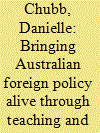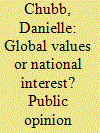| Srl | Item |
| 1 |
ID:
170406


|
|
|
|
|
| Summary/Abstract |
If we are to help students develop opinions and perspectives on world politics, and understand at the same time what it means to hold these opinions and perspectives in the Australian context, we need to bring the world to the classroom. Information overload has led to feelings of alienation among students, and the way we teach needs to instil in students a sense that they are stakeholders in Australian foreign policy, and help them develop strategies for incorporating the complex information environment into their learning. In this short piece I propose two forms of assessment that authentically place the focus on these learning outcomes.
|
|
|
|
|
|
|
|
|
|
|
|
|
|
|
|
| 2 |
ID:
192080


|
|
|
|
|
| Summary/Abstract |
This article examines Australian attitudes towards foreign aid and the intersection of these attitudes with broader debates around the purpose and level of the aid program. Drawing on surveys conducted over six decades, we show that the public broadly supports the principle of foreign aid, but are much less supportive of aid expenditure, especially judged against other areas of government spending. Using the 2022 Lowy Poll, we test four hypotheses to explain public support for foreign aid. The results show that both values and interests shape the public’s views of foreign aid spending. The challenge for policymakers is to craft messages about foreign aid which present aid expenditure as being relevant to both the values and interests relevant to the lives of everyday Australians.
|
|
|
|
|
|
|
|
|
|
|
|
|
|
|
|
| 3 |
ID:
165210


|
|
|
| 4 |
ID:
172235


|
|
|
|
|
| Summary/Abstract |
How and why have Australians come to view some infringement of their civil liberties as an acceptable trade-off in the interest of countering terrorism? This article contributes to understandings of preference formation by placing the focus on the interaction of public and elite perceptions of terrorism and counter-terrorism, over an extended time period. I trace the trajectory of Australian public debate over the course of four decades, through the lens of three intervening critical junctures; the 1978 Hilton bombing, Australia’s experience with international terrorism in the early twenty-first century, and the rise of ‘home grown’ terror from 2014. By uncovering the domestic dynamics that characterise public discourse and debate at each of these junctures, a more complete picture emerges of how Australian society understands and enacts counter-terror policy in response to the transnational terror threat.
|
|
|
|
|
|
|
|
|
|
|
|
|
|
|
|
| 5 |
ID:
185165


|
|
|
|
|
| Summary/Abstract |
The further isolation of North Korea in response to the Covid-19 pandemic is a timely reminder that when it comes to the question of how to bring about change with relation to North Korea, a combination of creative and differentiated approaches are needed. In this piece, we argue that preparations for a just future transition on the Korean peninsula must start now. This commentary considers the possibilities for Australia to support just transition, in whatever form it may take, through immediate action not focused on bilateral or state-centric relations, but instead through other spaces in a broadly defined civil society. Effective Australian support for transitional justice and overall wellbeing of North Koreans must overcome structural barriers to opportunity for North Koreans within Australia, as well as barriers of overly securitised paradigms.
|
|
|
|
|
|
|
|
|
|
|
|
|
|
|
|